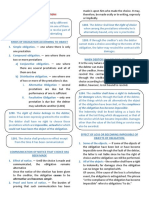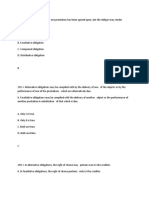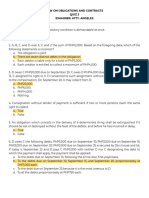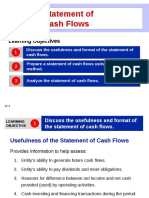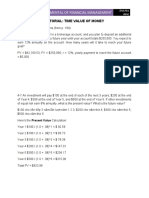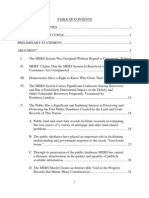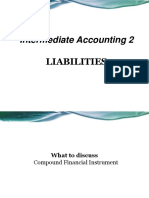Application of Payments
Application of Payments
Uploaded by
Roger de DiosCopyright:
Available Formats
Application of Payments
Application of Payments
Uploaded by
Roger de DiosOriginal Description:
Copyright
Available Formats
Share this document
Did you find this document useful?
Is this content inappropriate?
Copyright:
Available Formats
Application of Payments
Application of Payments
Uploaded by
Roger de DiosCopyright:
Available Formats
Application of Payments
Articles 1252-1254
Obligations and Contracts
Art. 1252. He who has various debts of the same kind in favor of one and the same creditor, may
declare at the time of making the payment, to which of them the same must be applied. Unless the parties
so stipulate, or when the application of payment is made by the party for whose benefit the term has been
constituted, application shall not be made as to debts which are not yet due.
If the debtor accepts from the creditor a receipt in which an application of the payment is made, the
former cannot complain of the same, unless there is a cause for invalidating the contract.
Art. 1253. If the debt produces interest, payment of the principal shall not be deemed to have been
made until the interests have been covered.
Art. 1254. When the payment cannot be applied in accordance with the preceding rules, or if
application cannot be inferred from other circumstances, the debt which is most onerous to the debtor,
among those due, shall be deemed to have been satisfied.
If the debts due are of the same nature and burden, the payment shall be applied to all of them
proportionately.
Discussions
Application payment is the designation of the debt which is being paid by a debtor who has several
obligations of the same kind in favor of the creditor to whom payment is made.
The situation in application of payments is that a debtor owes his creditor. There are several debts
due, but the debtor cannot pay all of the debts due.
The creditor can always not accept application of payments since the creditor cannot be compelled
to accept partial performance of the obligation. However, this may not be wise since the debtor may
have other creditors.
The rules on application of payment solve the problem of distributing the payment which is less
than the total obligation.
Rules in Application of Payment
1st Rule: Apply in accordance with the agreement.
2nd Rule: If there is no agreement, the debtor has the right to apply.
3rd Rule: If the debtor does not choose, the creditor can choose.
4th Rule: Apply to the most onerous debt (Article 1254, par 1)
Rules to Determine Which is the More Onerous Obligation
i. An interest bearing obligation is more onerous than a non-interest bearing
obligation.
ii. An older debt is more onerous than a recent debt.
iii. An obligation where the party is bound as a principal is more onerous than an
obligation is bound as a surety.
iv. An obligation which is secured is more onerous than an obligation which is
unsecured.
v. An obligation with a penal clause is more onerous than an obligation without a
penal clause.
5th Rule: If equally onerous, apply proportionately (Article 1254, par 2)
Prepared by RCD
You might also like
- Chapter 4. Reformation of ContractsDocument3 pagesChapter 4. Reformation of ContractsRose Anne CaringalNo ratings yet
- ObliCon - Chapter 2 4-4Document1 pageObliCon - Chapter 2 4-4Mi MingkaiNo ratings yet
- Notes PayableDocument8 pagesNotes Payablechamie143No ratings yet
- Nhóm 4 - In-Class Exercise BOP - 2020Document36 pagesNhóm 4 - In-Class Exercise BOP - 2020Thảo Hoàng PhươngNo ratings yet
- Oblicon ReviewerDocument6 pagesOblicon ReviewerFatima Elaine AtienzaNo ratings yet
- Outline1252 1304Document21 pagesOutline1252 1304Mrij KyzerNo ratings yet
- Oblicon ReviewerDocument6 pagesOblicon ReviewerFranz Danielle DatuNo ratings yet
- OBLICON Kinds of RemissionDocument2 pagesOBLICON Kinds of RemissionAnonymous RmMmOZNo ratings yet
- Explanation of Article 1226Document3 pagesExplanation of Article 1226hyunsuk fhebieNo ratings yet
- Notes For Civil Code Article 1177 and Article 1178Document5 pagesNotes For Civil Code Article 1177 and Article 1178Chasz CarandangNo ratings yet
- CHAPTER 7 ObliconDocument3 pagesCHAPTER 7 ObliconShanelle Tamayo NapolesNo ratings yet
- Article 1279Document6 pagesArticle 1279Danica BalinasNo ratings yet
- SECTION 5 ObliconDocument30 pagesSECTION 5 ObliconAngel CabanNo ratings yet
- Section 3 Alternative Obligations: For Damages When, Through The Fault of The DebtorDocument7 pagesSection 3 Alternative Obligations: For Damages When, Through The Fault of The DebtorRNo ratings yet
- Art 1216Document12 pagesArt 1216Paolo NazarenoNo ratings yet
- 1, Title XVII, of This Book. (N)Document4 pages1, Title XVII, of This Book. (N)Bernalyn Manaog100% (1)
- Tax-1-Solutions Bsa Quiz - Theories W AnsDocument6 pagesTax-1-Solutions Bsa Quiz - Theories W AnsCyrss BaldemosNo ratings yet
- Balasico, Sarah S. FM21 SECTION 1. - Pure and Conditional ObligationsDocument4 pagesBalasico, Sarah S. FM21 SECTION 1. - Pure and Conditional Obligationsmarinel juneNo ratings yet
- CHAPTER 3, Section 6: Obligations With A Penal ClauseDocument13 pagesCHAPTER 3, Section 6: Obligations With A Penal ClauseSergio ConjugalNo ratings yet
- CHAPTER 6 (Arts. 1380-1389)Document6 pagesCHAPTER 6 (Arts. 1380-1389)Kaye RabadonNo ratings yet
- PartnershipDocument32 pagesPartnershipjacintojordanmichaelNo ratings yet
- Oblicon - de Leon Chapter 1 General Provisions NotesDocument2 pagesOblicon - de Leon Chapter 1 General Provisions NotesKevin SusonNo ratings yet
- Article 1163-1178Document5 pagesArticle 1163-1178BAROTEA Cressia Mhay G.No ratings yet
- Article 1890-1891Document5 pagesArticle 1890-1891Dennis Dwane MacanasNo ratings yet
- Art 1160Document2 pagesArt 1160Danica BalinasNo ratings yet
- Article 1179-1188Document2 pagesArticle 1179-1188Renzo Miguel SiaoNo ratings yet
- Oblicon Reviewer - (Art. 1386-87)Document3 pagesOblicon Reviewer - (Art. 1386-87)Mark David DaculaNo ratings yet
- Chapter 4 (Business Law)Document24 pagesChapter 4 (Business Law)Steffi Anne D. ClaroNo ratings yet
- Law On SalesDocument12 pagesLaw On SalesNeil RyanNo ratings yet
- Law 20Document10 pagesLaw 20ram RedNo ratings yet
- 7&8 - Analytics Workbook - v2023-6Document30 pages7&8 - Analytics Workbook - v2023-6Karla Cathrina FernandoNo ratings yet
- Article 1216-1221Document1 pageArticle 1216-1221Adonis ClementeNo ratings yet
- Oblicon 1-5Document17 pagesOblicon 1-5Vanessa Evans CruzNo ratings yet
- Exemptions of Article 3 of The Civil Code of The PhilippinesDocument2 pagesExemptions of Article 3 of The Civil Code of The PhilippinesMona LizaNo ratings yet
- Law On Obligations and ContractsDocument22 pagesLaw On Obligations and ContractsLuhenNo ratings yet
- (Chim Flordeliza) Defective Contracts ReviewerDocument12 pages(Chim Flordeliza) Defective Contracts ReviewerAnthony ChoiNo ratings yet
- Who Is Liable To Make The PaymentDocument4 pagesWho Is Liable To Make The PaymentCJ CorpuzNo ratings yet
- Oblicon Art 1231 OnwardsDocument7 pagesOblicon Art 1231 OnwardsMajorie ArimadoNo ratings yet
- STATEMENT II: The Nullity Od The Penal Clause Carries With It The Nullity of The Principal ObligationDocument11 pagesSTATEMENT II: The Nullity Od The Penal Clause Carries With It The Nullity of The Principal ObligationCrizhae OconNo ratings yet
- Section 2 Loss of The Thing DueDocument3 pagesSection 2 Loss of The Thing DueGwen CaldonaNo ratings yet
- Article 1156-1162Document5 pagesArticle 1156-1162Kim JennieNo ratings yet
- Partnership Lecture Notes Chapter 1 4 - CompressDocument16 pagesPartnership Lecture Notes Chapter 1 4 - CompressMikee Rizon100% (1)
- Section 11-16Document6 pagesSection 11-16Jane GonzalesNo ratings yet
- Chapter 3 (Section 2) - Obligations With A PeriodDocument39 pagesChapter 3 (Section 2) - Obligations With A PeriodTanya KimNo ratings yet
- in Solidum 4. Mancommunada Solidaria 5. Juntos o SeparadamenteDocument10 pagesin Solidum 4. Mancommunada Solidaria 5. Juntos o SeparadamenteVEDIA GENONNo ratings yet
- (1011) Quiz 2 - With AnswersDocument16 pages(1011) Quiz 2 - With Answershatdognamaycheese123No ratings yet
- Article 1226 OBLICONDocument1 pageArticle 1226 OBLICONGwen CaldonaNo ratings yet
- Articles 1156-1305 Civil CodeDocument12 pagesArticles 1156-1305 Civil CodeFarhani Sam RacmanNo ratings yet
- Contracts - Chapter 1 AGCAOILIDocument2 pagesContracts - Chapter 1 AGCAOILILeinard Agcaoili100% (2)
- Chapter Exam - Partnership Dissolution - 3Document13 pagesChapter Exam - Partnership Dissolution - 3NarikoNo ratings yet
- MIDTERM EXAM - LAW - Group ADocument10 pagesMIDTERM EXAM - LAW - Group APrincess Corine BurgosNo ratings yet
- Article 1281 Article 1283Document5 pagesArticle 1281 Article 1283kaye like the replyNo ratings yet
- CHAPTER 3, Section 2: Obligations With A PeriodDocument16 pagesCHAPTER 3, Section 2: Obligations With A PeriodSergio ConjugalNo ratings yet
- General Provisions Summary NotesDocument4 pagesGeneral Provisions Summary Notesfklakjdkjfla100% (1)
- Art 1156-1180 Own NotesDocument11 pagesArt 1156-1180 Own NotesKEWKNo ratings yet
- NovationDocument4 pagesNovationVillena Divina VictoriaNo ratings yet
- Chapter 3 ObliconDocument10 pagesChapter 3 ObliconLarry Calata AlicumanNo ratings yet
- The Laws On Partnership General ProvisionsPart1Document24 pagesThe Laws On Partnership General ProvisionsPart1Angelita Dela cruzNo ratings yet
- Contracts - General ProvisionDocument7 pagesContracts - General ProvisionJpagNo ratings yet
- Vii. Who Pays For Expenses For Making Payment ART. 1247 Debtor Pays For Extrajudicial ExpensesDocument19 pagesVii. Who Pays For Expenses For Making Payment ART. 1247 Debtor Pays For Extrajudicial ExpensesDianne RosalesNo ratings yet
- Oblicon Articles 1252-1261Document5 pagesOblicon Articles 1252-1261kumiko sakamoto100% (1)
- Civil Law Review Ii MidtermsDocument8 pagesCivil Law Review Ii MidtermsKatherine Jane UnayNo ratings yet
- Business and Personal Finance Unit 2 Chapter 6 2007 Glencoe500Document81 pagesBusiness and Personal Finance Unit 2 Chapter 6 2007 Glencoe500Avi ThakurNo ratings yet
- The Abidjan Airport Concession Facing Regional Aviation LiberationDocument12 pagesThe Abidjan Airport Concession Facing Regional Aviation LiberationOmotola AwojobiNo ratings yet
- Parking System Review by Carl Walker AlburququeDocument161 pagesParking System Review by Carl Walker AlburququeBarun Gupta100% (1)
- Colgate Ratio Analysis WSM 2020 SolvedDocument19 pagesColgate Ratio Analysis WSM 2020 Solvedwan nur anisahNo ratings yet
- Neelkanth Salt Chem India Private LimitedDocument5 pagesNeelkanth Salt Chem India Private LimitedcharananwarNo ratings yet
- Statement of Cash Flows: Learning ObjectivesDocument84 pagesStatement of Cash Flows: Learning ObjectivesHanifah OktarizaNo ratings yet
- Benefits of DeflationDocument3 pagesBenefits of DeflationMasimba MafukidzeNo ratings yet
- Piramal_SanctionLetterDocument3 pagesPiramal_SanctionLettersuhasg2000No ratings yet
- Brigham & Ehrhardt: Financial Management: Theory and Practice 14eDocument46 pagesBrigham & Ehrhardt: Financial Management: Theory and Practice 14eAmirah AliNo ratings yet
- CASE PresentationDocument29 pagesCASE PresentationErro Jaya RosadyNo ratings yet
- TUTORIAL TVM Feb17Document15 pagesTUTORIAL TVM Feb17Phong DươngNo ratings yet
- Q Jan Feb 2022 EXAMDocument14 pagesQ Jan Feb 2022 EXAMphumelele100% (1)
- FORECLOSURE FIGHTER April Charney Files Amicus BriefDocument58 pagesFORECLOSURE FIGHTER April Charney Files Amicus BriefDinSFLA100% (3)
- kc2 Practice Revision Kit PDFDocument248 pageskc2 Practice Revision Kit PDFVinthuja MurukesNo ratings yet
- 169 - 171 - G.R. No. 195641 Case DigestDocument2 pages169 - 171 - G.R. No. 195641 Case DigestRennette AlfaroNo ratings yet
- Terry Thomas - COMPLAINTDocument80 pagesTerry Thomas - COMPLAINTpolychromeNo ratings yet
- Factors Affecting Financial DecisionsDocument4 pagesFactors Affecting Financial Decisionsshubham_cool1996No ratings yet
- Chapter 11 Fundamental AnalysisDocument37 pagesChapter 11 Fundamental AnalysisSamuel DwumfourNo ratings yet
- What Is The Difference Between Yield To Maturity and The Coupon Rate?Document3 pagesWhat Is The Difference Between Yield To Maturity and The Coupon Rate?khushimaharwalNo ratings yet
- Financial liter-WPS OfficeDocument4 pagesFinancial liter-WPS OfficehamsirujimarNo ratings yet
- Project Report On Project FinancingDocument93 pagesProject Report On Project FinancingVaibhav Goyal100% (4)
- PMC Application - MAY08Document17 pagesPMC Application - MAY08Nathan WilliamsNo ratings yet
- Objectives and Research Methodology: ObjectiveDocument82 pagesObjectives and Research Methodology: ObjectiveRahul RanjanNo ratings yet
- Cgmax Management Case Study May 2019 Exam Answers: Section 1 Expanding ProductionDocument9 pagesCgmax Management Case Study May 2019 Exam Answers: Section 1 Expanding ProductionsangNo ratings yet
- Ratio Analysis About S.R. Steel IndustriesDocument51 pagesRatio Analysis About S.R. Steel IndustriesshaileshNo ratings yet
- Ia2 LiabilitiesDocument14 pagesIa2 LiabilitiesMeiNo ratings yet
- A Plan With The Potential To Maximise Your Returns and Your DreamsDocument37 pagesA Plan With The Potential To Maximise Your Returns and Your DreamssaanjliNo ratings yet
- Bond MarketsDocument7 pagesBond Marketsbutter is better than margarineNo ratings yet













